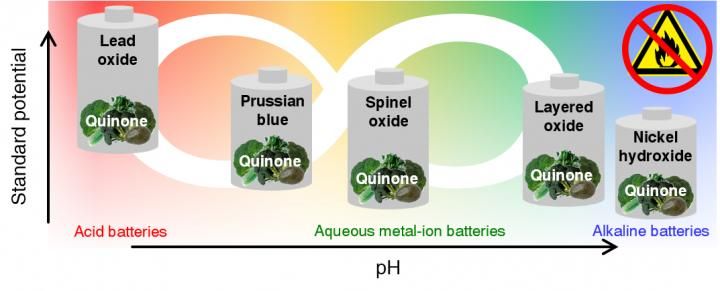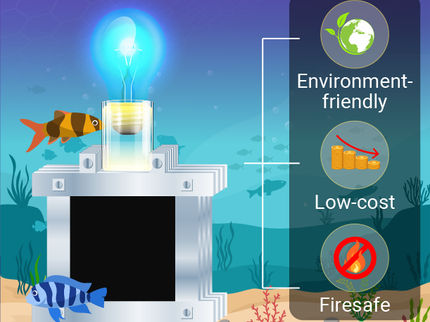Inexpensive organic material gives safe batteries a longer life
Modern batteries power everything from cars to cell phones, but they are far from perfect - they catch fire, they perform poorly in cold weather and they have relatively short lifecycles, among other issues. Now researchers from the University of Houston have described a new class of material that addresses many of those concerns.

UH researchers have discovered a new material that has proven an effective anode for acid and alkaline batteries, including emerging aqueous metal-ion batteries, offering the promise of safe, long-lasting batteries that work across a range of temperatures.
University of Houston
The researchers, led by Yan Yao, associate professor of electrical and computer engineering, report their use of quinones -- an inexpensive, earth-abundant and easily recyclable material -- to create stable anode composites for any aqueous rechargeable battery.
"This new material is cheap and chemically stable in such a corrosive environment," said Yao, who is also a principal investigator with the Texas Center for Superconductivity at UH, with an appointment to the chemical and biomolecular engineering faculty. The material also can be used to create a "drop-in replacement" for current battery anodes, allowing the new material to be used without changing existing battery manufacturing lines, he said.
"This can get to market much faster," he said.
Yao and his lab, including research associate Yanliang Liang, who served as first author on the paper, began the work in 2013, after he was awarded $1 million from the Department of Energy's Advanced Research Project Agency - Energy (ARPA-E) RANGE program to develop new battery technology. Other researchers involved in the project include Yan Jing, Saman Gheytani and Kuan-Yi Lee, all of UH, Ping Liu of the University of California-San Diego, and Antonio Faccheti of Northwestern University.
Energy storage is the key to wider adoption of electric cars, wind and solar power, along with other clean energy technologies. But the development of battery storage systems, which would be able to store energy until it is needed and then be recharged with additional generation, has been hampered by the lack of batteries that meet a variety of requirements: environmentally friendly, safe, inexpensive and long-lasting.
"Aqueous rechargeable batteries featuring low-cost and nonflammable water-based electrolytes are intrinsically safe and ... (provide) robustness and cost advantages over competing lithium-ion batteries that use volatile organic electrolytes and are responsible for recent catastrophic explosions," the researchers wrote. But state-of-the-art aqueous rechargeable batteries have a short lifespan, making them unsuitable for applications where it isn't practical to replace them frequently.
The stumbling block, Yao said, has been the anode, the portion of the battery through which energy flows. Existing anode materials are intrinsically structurally and chemically unstable, meaning the battery is only efficient for a relatively short time.
They worked with quinones, an earth-abundant organic material which Yan said costs just $2 per kilogram, demonstrating the material's benefits in three formulations.
The differing formulations offer evidence that the material is an effective anode for both acid batteries and alkaline batteries, such as those used in a car, as well as emerging aqueous metal-ion batteries, Liang said. That means the quinones-based anode will work regardless of which technology dominates in the future, he said.
The new material also allows the batteries to work across temperature ranges, Liang said, unlike some conventional aqueous batteries, which are notoriously balky in cold weather.
Yao said consumers would quickly notice one key difference in this change to existing battery technology. "One of these batteries, as a car battery, could last 10 years," he said. In addition to slowing the deterioration of batteries for vehicles and stationary electricity storage batteries, it also would make battery disposal easier because the material does not contain heavy metals.
The researchers have filed for three patents for the technology and hope to find partners to commercialize the technology.
Original publication
Other news from the department science
Most read news
More news from our other portals
See the theme worlds for related content
Topic World Battery Technology
The topic world Battery Technology combines relevant knowledge in a unique way. Here you will find everything about suppliers and their products, webinars, white papers, catalogs and brochures.

Topic World Battery Technology
The topic world Battery Technology combines relevant knowledge in a unique way. Here you will find everything about suppliers and their products, webinars, white papers, catalogs and brochures.





























































